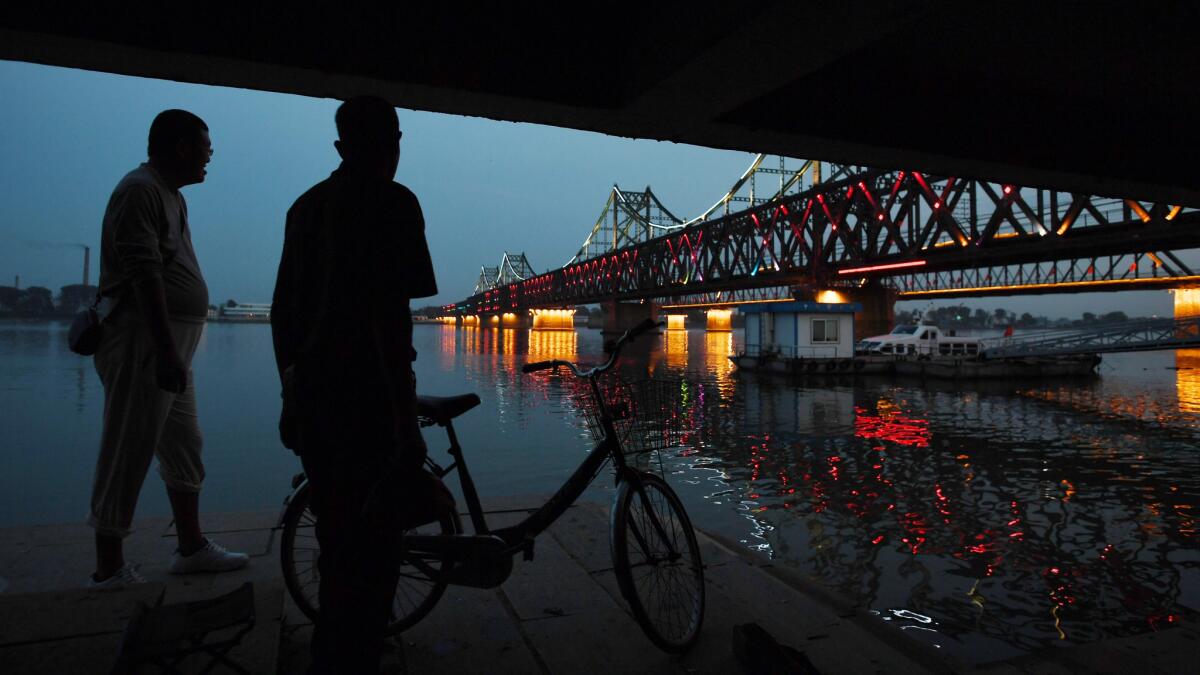Here’s why China refuses to block North Korea’s nuclear ambitions
- Share via
Reporting from Beijing — China’s latest diplomatic crisis began with an earthquake in a region not known for seismic activity.
North Korea confirmed international fears hours later, when a woman in a bubble-gum pink dress went on state television to announce that the country had tested its fifth, and strongest, nuclear weapon.
China immediately denounced the test, which occurred Friday. But Chinese analysts don’t expect Beijing to do much else. Concerned about the implications of a North Korean collapse, China shows little appetite for confrontation.
This reserve illustrates how the one country with power to stop North Korea’s nuclear ambitions is paralyzed by its tiny, upstart neighbor, which has no other allies.

“The reason North Korea dared to conduct this nuclear test is because it knew the Chinese are very much handcuffed,” said Tong Zhao, an associate at Carnegie-Tsinghua Center for Global Policy in Beijing.
China is the only lifeline for leader Kim Jong Un, whose test coincided with the anniversary of the founding of the Democratic People’s Republic of Korea by his grandfather. The bigger neighbor accounts for 90% of North Korea’s trade, much of it along the Yalu River, which serves as a border between the two countries.
Leaders worry that economic upheaval in the totalitarian nation could flood northeastern China with millions of refugees, Zhao said. But they fear much more the loss of a buffer between China and U.S.-backed South Korea, with its nearly 30,000 American troops.
China already is incensed at a July agreement between Seoul and the U.S. to deploy a missile defense system, known as Terminal High Altitude Area Defense, to protect the South from any Pyongyang attacks. Beijing sees the equipment as a threat to its own national security. China has displayed its anger by backing out of defense talks in Seoul and canceling performances that feature South Korean entertainers.
The tensions threaten efforts at any unified strategy toward North Korea. And they likely handed the unpredictable, 32-year-old Kim a greater opportunity to flout international sanctions.
“For China, North Korea is a necessary evil,” said Zhang Baohui, the director of the Center for Asian Pacific Studies at Lingnan University in Hong Kong. “China has to maintain the survival of the North Korean regime. That’s its fundamental quagmire.”
Beijing agreed to United Nations Security Council sanctions against North Korea in March, although loopholes kept the border porous.
See the most-read stories in World News this hour »
Stronger sanctions, which Zhang doubts China will approve, would further choke trade. North Korea relies on China’s oil pipeline, and its larger neighbor could inflict significant pain by chopping access. But that might cause economic disaster for North Korea, causing it to see Beijing as an enemy rather than a half-hearted ally.
So far, Beijing has agreed only to push for multi-country talks that stalled seven years ago.
At a meeting Saturday, Chinese Vice Foreign Minister Zhang Yesui told North Korea’s ambassador, Ji Jae Ryong, that the nuclear tests “run counter to the expectations of the international community, escalate tension on the peninsula and [are] not conducive to the peace and stability there,” according to the official New China News Agency.
A separate commentary by the news agency cautioned restraint on the Korean peninsula, which it called “a tinderbox” that could ignite with a spark.
“From China’s point of view, North Korea’s real weapon of destruction is chaos,” said Euan Graham, former charge d’affairs at the British embassy in Pyongyang and current international security program director at the Lowy Institute for International Policy in Australia. “The fear of chaos runs so deep in the Chinese psyche that it’s this overriding fear [that dominates] rather than one of a freelancing and uncontrollable ally.”
Chinese leader Mao Tse-tung once described the relationship with its Communist brother North Korea as close “as lips to teeth.”
Those days are gone. Fissures started to show in 2006 after Pyongyang conducted its first nuclear weapons test and Beijing backed sanctions. China’s tone has since rotated between condemnation and appeasement. Despite concerns about the country’s nuclear goals, a top Chinese Communist Party member attended North Korea’s military parade to celebrate the ruling party’s 70th anniversary.
And yet Kim thumbed his nose at his Communist partner this month, launching three ballistic missiles toward the Sea of Japan as China was hosting its first G-20 summit of world leaders. Chinese President Xi Jinping has never invited Kim to visit. Some Chinese social media users refer to the young leader, the third member of his family to rule North Korea, as “Fatty Kim III.”
“China has many options,” said Go Myong-Hyun, a research fellow at the Asan Institute for Policy Studies in Seoul. “What China is lacking is willingness.”
Current sanctions don’t appear to have much effect. A report by two researchers at Harvard University and the Massachusetts Institute of Technology found they actually improved North Korea’s ability to procure material for its weapons plan. The North opened offices in China and hired more capable Chinese middlemen to avoid sanctions, they said. Obama, at a news conference last week, acknowledged the actions failed to do much.
“Chinese policy experts have rightly suggested that the Obama administration has done little with the Korean nuclear challenge,” said Zhang, the Hong Kong professor.
Beijing now kicks the ball to the U.S. and South Korea he said. “China has accepted the reality of a nuclear North Korea.”
Meyers is a special correspondent.
North Korea’s latest nuclear test could be a key step in its weapons program
Korea’s smash summer hit is a zombie movie that strikes a deep chord
More to Read
Sign up for Essential California
The most important California stories and recommendations in your inbox every morning.
You may occasionally receive promotional content from the Los Angeles Times.










